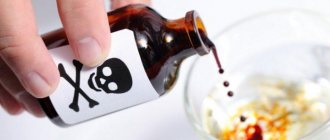Beer
Beer poisoning, the symptoms of which resemble intoxication of the body with stronger drinks, is often observed. Beer is considered to be a light alcohol that can be drunk in unlimited quantities without fear of getting beer poisoning. This misconception leads to an increasing number of people suffering from alcohol poisoning from beer, since it can be consumed on an empty stomach or with a snack of dubious quality. And this affects the functioning of the gastrointestinal tract.
In addition, beer is a food product. The safety of its use depends on the quality of the drink. A spoiled product may contain harmful substances that will adversely affect the functioning of the body and can even cause food poisoning. The most dangerous thing for health is consuming a sour product.
General information about beer
Beer is a low-alcohol drink made from malt wort, brewer's yeast and hops. There is no single classification, and therefore alcohol is usually divided according to:
- color (light, dark);
- strength (from non-alcoholic to strong);
- filterability (filtered and unfiltered);
- fermentation method (bottom and top).
Any drink based on hops and malt can be given its own designation in each of the classifications. Live beer is a separate type, distinguished by the fact that it is not filtered or subjected to a pasteurization process.
Is it possible to get poisoned by beer? Yes, this is possible, and it does not matter what characteristics the product has.
Causes of beer poisoning
Classic beer is a drink made from malt (barley), hop cones and yeast. Is it possible to get poisoned by beer made according to this recipe? If you believe classical works, then even before it was possible to drink too much of something fermented or get poisoned by a drink made from the wrong cones.
Today, such beer can only be found in select breweries or made independently, and the drink sold in most stores is made from powder and various additives. The finished beer wort is dried, a little hops and malt (expensive ingredients) are added or not, yeast is added and diluted with water, offering it to all beer lovers.
Private breweries also rarely brew according to old recipes, preferring to use malt concentrate, and to speed up the fermentation process they add special inhibitors, carbon dioxide, artificial foaming agents, flavor enhancers and many other ingredients.
Attention! Adding concentrates and other compounds to beer worsens the quality of the product and increases the risk of poisoning.
Here are the main causes of poisoning:
- Beer intoxication – the ethyl alcohol content in beer can reach from 3% to 6% (strong varieties can contain up to 14% alcohol). But this amount is enough to cause intoxication if you drink more than a few liters at a time. The risk of intoxication increases if you drink beer on an empty stomach, mix it with other alcoholic drinks, or if you are highly sensitive to alcohol.
- Allergy – if you are intolerant to alcoholic drinks, symptoms of poisoning can occur even after one glass of beer. An allergic reaction more often occurs to canned, high-concentrated varieties, or to new varieties that have various compounds added to enhance the taste.
- The addition of surrogate alcohol is one of the most common causes of beer poisoning, the symptoms of which force patients to seek medical help. Adding alcohol surrogates helps increase the “degree” of the drink and increases the risk of poisoning several times. In this case, drug poisoning can occur even when taking a small dose of the drink.
- Expired beer – each type of drink has its own expiration date. The answer to the question: can beer go sour is unequivocal - easily. Sour beer begins to break down into its components: yeast, malt and hop extract (if it was a natural drink), preservatives and cobalt (in powder), carcinogenic components and a large number of bacteria and their waste products. A sour drink can cause serious intoxication or food poisoning, so you should always pay attention to the expiration date of the drink and do not buy “stagnant” beer with a characteristic, sour smell.
- Failure to comply with sanitary and hygienic standards - most often these norms and rules are violated when selling draft beer. Dirty hands or containers, mixing acidic residues with fresh and other violations lead to the appearance of symptoms of poisoning.
Why do poisonings occur?
Beer intoxication is not uncommon, although it seems that the drink has a very low strength, which means there can’t be anything very harmful in it. This opinion is wrong. Toxins from beer can enter the body for the following reasons:
- the product has expired;
- the drink was stored or transported incorrectly;
- The sale of the drink does not comply with sanitary and epidemiological standards.
The greatest danger is always draft beer, which is sold in tents. In the hottest days, such tents can be found right in the sun, where the drink will be steamed in closed barrels, although the optimal storage temperature is 10-20 ºС. When bottling beer, no one will care about the cleanliness of the container, the daily change of the bottling system, or the availability of a health certificate from the distributor.
Due to all these features, it is much easier to get poisoned with draft beer than with a product sold in bottles in stores.
Many people mistakenly believe that poisoning from expired beer is impossible. This is not true. If beer is expired, pathogenic microorganisms that can cause an intestinal infection begin to actively multiply in it.
How much beer do you drink in a week?
What is the actual composition of beer?
The amount of ethyl alcohol in beer ranges from 4% to 12%. If we compare it with vodka, then 1 liter of beer contains about 150 ml of this strong drink. It is logical to assume that poisoning of the body occurs due to the ethanol present in the composition. However, not everyone is aware that in addition to alcohol, beer also contains a fairly large number of harmful elements. Almost any beer drink contains:
- Harmful carcinogenic resins.
- All kinds of drugs obtained from hops.
- Methanol, isopropanol and other alcohols that are toxic.
- Harmful oils obtained from malt and barley.
- An analogue of cadaveric poison is cadaverine.
- A large number of different preservatives.
- Waste products of all kinds of yeast-type bacteria.
And although all of the listed elements are contained in beer in small quantities, their concentration in the body increases as the number of bottles of the drink consumed by a person increases. Since beer drinking sessions usually involve drinking large amounts of alcohol, it is not surprising that harmful substances gradually accumulate, ultimately leading to poisoning. Frequent beer holidays can provoke the occurrence of the following diseases: cardiovascular, liver, kidney problems, cancer.
We recommend that you familiarize yourself with what Spice is and how to provide first aid in case of an overdose.
An equally dangerous drug is amphetamine, familiarize yourself with the main symptoms and consequences of an amphetamine overdose.
Symptoms
Symptoms of intoxication poisoning are divided into three categories depending on the stage of intoxication. Mild intoxication is characterized by:
- excitement;
- high emotionality;
- increased motor and speech activity;
- reduction of criticism;
- increased salivation and sweating;
- redness of the face and sparkle in the eyes.
Mild intoxication usually resolves on its own; help is not required even at home if the person does not continue to drink alcohol. If drinking beer continues, then mild intoxication turns into moderate intoxication, characterized by:
- decreased self-criticism and self-esteem;
- “slurring speech”;
- deterioration in coordination of movements;
- absentmindedness;
- decreased motor activity.
The outcome of moderate intoxication is a hangover syndrome. If a person does not stop drinking, severe intoxication occurs. Signs of severe poisoning:
- attacks of nausea and vomiting;
- slurred speech;
- inability to move independently;
- lethargy and drowsiness, turning into stupor;
- increased heart rate;
- jump in blood pressure.
Symptoms of beer poisoning, without outside help, will progress, which can lead to coma and then death.
In case of beer poisoning, which is combined with the consumption of other low-quality drinks, complaints of abdominal pain, loss of vision, and the development of convulsions may occur.
What not to do if you are poisoned by beer
Oddly enough, one of the most frequently asked questions from patients is: is it possible to drink beer during or after poisoning to relieve a hangover? According to doctors, it is strictly forbidden to drink any alcohol-containing drinks after alcohol poisoning. This can provoke a sharp deterioration in the condition or the development of secondary poisoning, which will be much more severe than the first.
What else is not recommended to do in case of poisoning:
- Rinse the stomach with a solution of potassium permanganate - adding potassium permanganate to the water for rinsing can lead to a burn of the mucous membrane of the esophagus and stomach or provoke an exacerbation of gastritis and ulcers.
- Smoking can increase intoxication.
- Drinking coffee or strong tea – tea and coffee will also not help cope with the symptoms of poisoning. Drinks increase the load on the cardiovascular system and increase blood pressure, so it is better to avoid them.
- Eating fatty foods is a method used to prevent intoxication in order to reduce the absorption of alcohol in the stomach, but after poisoning, such food will only worsen the condition. It will only slow down the removal of toxins from the body and increase the load on the digestive system.
Features of first aid
What to do if a person is poisoned by beer? First of all, it is necessary to assess his condition and decide whether to call an ambulance. For mild to moderate intoxication, you can get help without leaving your home.
First aid consists of the following simple steps:
- providing the patient with a sufficient amount of fluid (tea, plain water);
- providing the patient with peace and the opportunity to sleep;
- taking medications that have an adsorbing effect (Smecta, Enterosgel, etc.).
If intoxication of moderate severity is determined, then in addition, before the above measures, it is recommended to perform gastric lavage. To do this, the poisoned person is given liquid in the amount of 500-1000 ml, and then vomiting is artificially induced by pressing on the root of the tongue.
What to do in case of poisoning if a person loses consciousness? First of all, place him on a hard surface, turning his head to the side. Then they must call the doctors.
Alcohol coma
In this state, patients are unconscious. Speech and motor activity are impossible. When tested, the pupils react extremely poorly to light.
The most active reaction is to ammonia or to pain stimulation of receptors. The response, as a rule, manifests itself in the form of slight movement of the limbs and dilation of the pupils.
If you do not bring a person out of a comatose state, it will gradually deepen. Over time, the pupils will stop responding to light stimulation. It is also likely that there is no response to painful stimulation. This state is characterized by absolute muscle relaxation and a gradual decrease in body temperature. Reflexes are completely absent.
Heroin addicts believe that Methadone can relieve addiction, this is a misconception, read more here.
For food poisoning, the drug Enterosgel is recommended, see the link
When is medical intervention needed?
In some cases, it is impossible to provide assistance to the patient on your own. Medical intervention is necessary if:
- there was a loss of consciousness;
- problems with the heart or breathing appeared;
- symptoms of delirium tremens developed, hallucinations began;
- there is a possibility of poisoning by surrogates;
- psychosis developed;
- the person has any chronic diseases.
The doctor, upon arriving at the place, will evaluate the symptoms and select treatment depending on them. In most cases, hospitalization in a hospital will be recommended, where the patient will be treated by specialists. Depending on the symptoms that appear, tracheal intubation, gastric lavage through a tube, forced diuresis or hemodialysis may be necessary.
Treatment of severe beer intoxication
In case of extremely severe intoxication, the patient must be hospitalized. Medical workers will lavage the victim’s stomach using a special tube. The patient will also be provided with breathing through tracheal intubation. In some cases, hemodialysis may be prescribed. It may also be necessary to stabilize the heart.
What consequences to expect?
If beer poisoning is treated correctly and in a timely manner, then dangerous consequences can be avoided. In case of severe intoxication, if help is not provided in a timely manner, you may encounter:
- reactive inflammation of the pancreas;
- inflammatory process in the kidneys;
- inflammation of the biliary tract.
Intoxication with an intoxicating drink can lead to an exacerbation of all chronic diseases. If a person suffers from an ulcer, bleeding may develop.
Severe intoxication
This stage is already characterized by all the main signs of alcohol intoxication. The most striking symptoms are as follows:
- Impaired diction.
- Nausea. Possible vomiting.
- Problems with balance and coordination of movements.
- Tachycardia.
- Reduced blood pressure.
- Drowsiness, gradually turning into a pre-comatose state.
If at this stage you do not bring the person to his senses and do not provide him with the necessary help, there is a possibility of falling into a coma.
Preventive measures
Prevention of alcohol poisoning from hops and malt is as follows:
- carefully choose the places where you will purchase the drink;
- check the packaging (there should be no drips, smudged letters or numbers, or expired expiration dates);
- refuse to buy beer at bottling sites if they do not have refrigerators;
- Do not drink a filtered drink that contains any cloudiness or sediment.
Beer is a very popular drink. Due to its popularity, cases of intoxication are not as rare as they may seem. To protect yourself or your loved ones, you must carefully follow preventive measures and know how to provide assistance in case of poisoning.
Other types of beer poisoning
When beer is combined with different types of other alcoholic drinks, symptoms of poisoning also occur. Exposure to methanol leads to disorder and deterioration of vision, quite severe pain in the abdomen and abdominal cavity. Consciousness is depressed, and a coma may develop.
When beer and other alcoholic products are combined, the stages of intoxication follow one another more quickly, and poisoning occurs much earlier.
In addition to alcohol poisoning, food poisoning is also possible. This occurs if the beer was drunk from dirty glasses, if the bartender who poured the drink had unwashed hands, etc. Symptoms of this poisoning are as follows: nausea, vomiting, upset stool, increased body temperature, pain in the abdominal area.
Mild type of intoxication
As a rule, this concept refers to a state of intoxication that does not affect the functioning of the body.
It is characterized by the following features:
- Red tint to the skin.
- Relaxation and excessive cheerfulness.
- Dulling of the instinct of self-preservation.
- Talkativeness.
- Heavy sweating, independent of climatic conditions.
In this case, alcohol poisoning from beer does not occur. There are no symptoms of the disease.
Signs of beer intoxication
Symptoms of poisoning usually appear 2-5 hours after drinking beer, but the severity depends on the quality and quantity of what was consumed. Main features:
- weakness;
- migraine;
- dehydration of the body;
- vomiting if the level of hydrochloric acid in the stomach rises;
- diarrhea, repeated discharge of diarrhea due to the colonization of the intestines by pathogenic bacteria in the case of drinking expired beer;
- cardiopalmus;
- cramps in different muscle groups;
- dizziness;
- paleness of the skin;
- increased heart rate, decreased blood pressure.
Reference! Symptoms usually go away within 1-3 days. If the poisoning is severe, then signs of intoxication and dyspeptic disorders can be observed for up to 5 days in a row, causing complications and damage to internal organs.
Drinking beer from plastic containers
Intoxication poisoning is often caused by toxic substances that are contained not in the expired product itself, but in the material used to make the container. It has been found that plastic bottles affect the characteristics of alcohol over time. When interacting with alcohol, the material gradually releases a toxic substance known as dibutyl phthalate. A high concentration of toxic chemicals in expired beer can lead not only to poisoning, but also to death. Therefore, it is better not to take unnecessary risks.
The most dangerous stage
If it develops, the patient is unable to move and speak, he does not have a rapid reaction of the pupils to bright light, and his body temperature is reduced. The person loses consciousness.
There are no reflexes. If these symptoms appear, you should immediately contact emergency services. After all, a coma can lead to the end of life. This serious consequence of poisoning often occurs when beer is consumed together with other alcoholic products (usually counterfeit). Before loss of consciousness, rapid and severe intoxication, deterioration of visual functions, and discomfort in the peritoneal area are observed.
to the page “Is it possible to drink sour beer?! ”
A friend who sells beer ferments it specifically for himself. I don't particularly like beer, but I love this fermented beer. In the summer I drink it cold, in the cold season I warm it up to a tolerable hot state. Helps against colds. The taste is not for everyone, but I really like it! My husband can't watch me drink it. So everything is for everyone! I also add this beer to pancake batter, without fanaticism, it’s also delicious! And I also noticed that I sleep better after a glass of hot beer in the evening. All the best!
In short, you are such sissies. Well, it’s sour, well, it’s not tasty, but nothing will happen to you. At most you'll lose your shit. My friends and I once drank all the fresh beer in a pub, but it was night outside and they didn’t sell alcohol. Well, the entrance went sour kegs. They drank and that was it, drank 2 kegs of sour stuff and nothing happened. So for an ordinary, relatively healthy person, nothing will happen except a gag reflex from taste quality)))
Mr.Mask never unsubscribed! Achtung!) I’m also sitting here drinking and thinking about going back and turning it in.
Well, this is some kind of kick-ass, was it really impossible to answer yes or no, why are they chewing snot everywhere...
I came to visit Svetlogorsk, the saleswoman in the store assured me that it was fresh, the barrels were changed every day! I took two liters of different varieties, both with a clearly sour taste, I was a fool myself, it’s clear that the point is so-so, even though it’s a tourist place. It’s impossible to drink the light one, the dark one is still so-so - I drank half a glass, but decided to pour it out and pour it with cognac for disinfection











